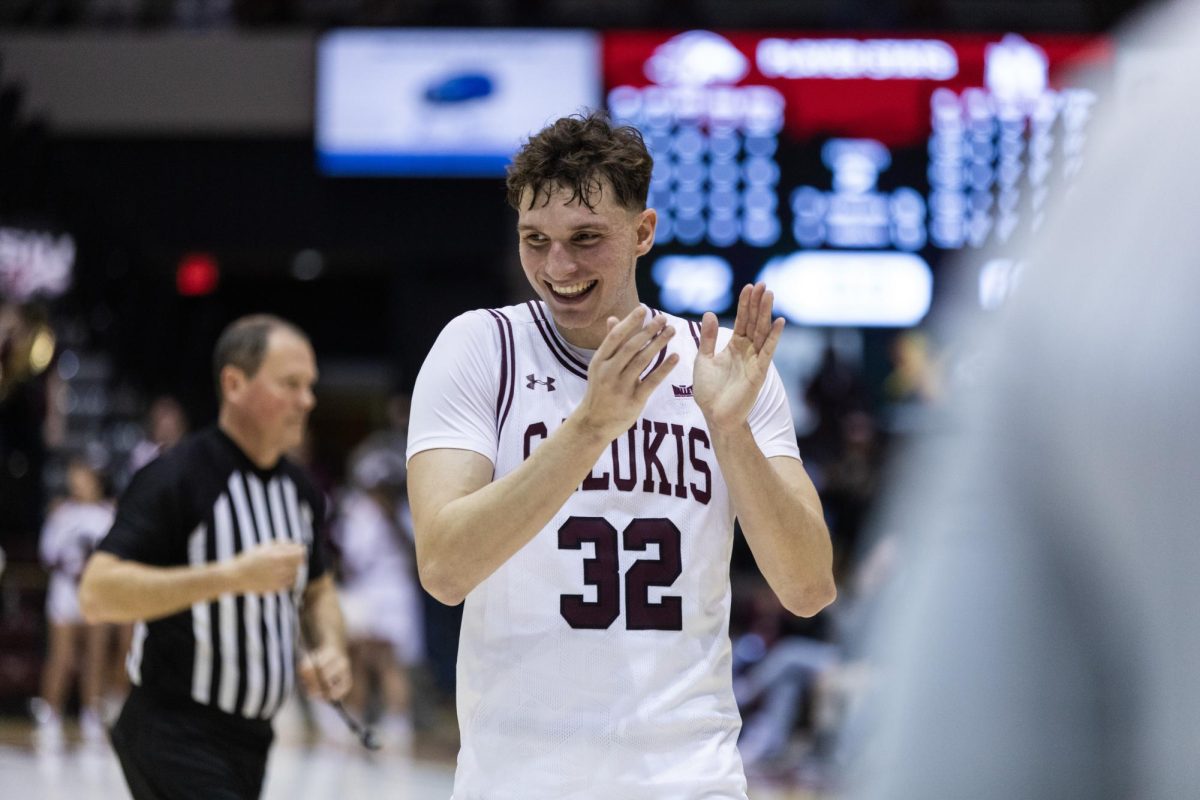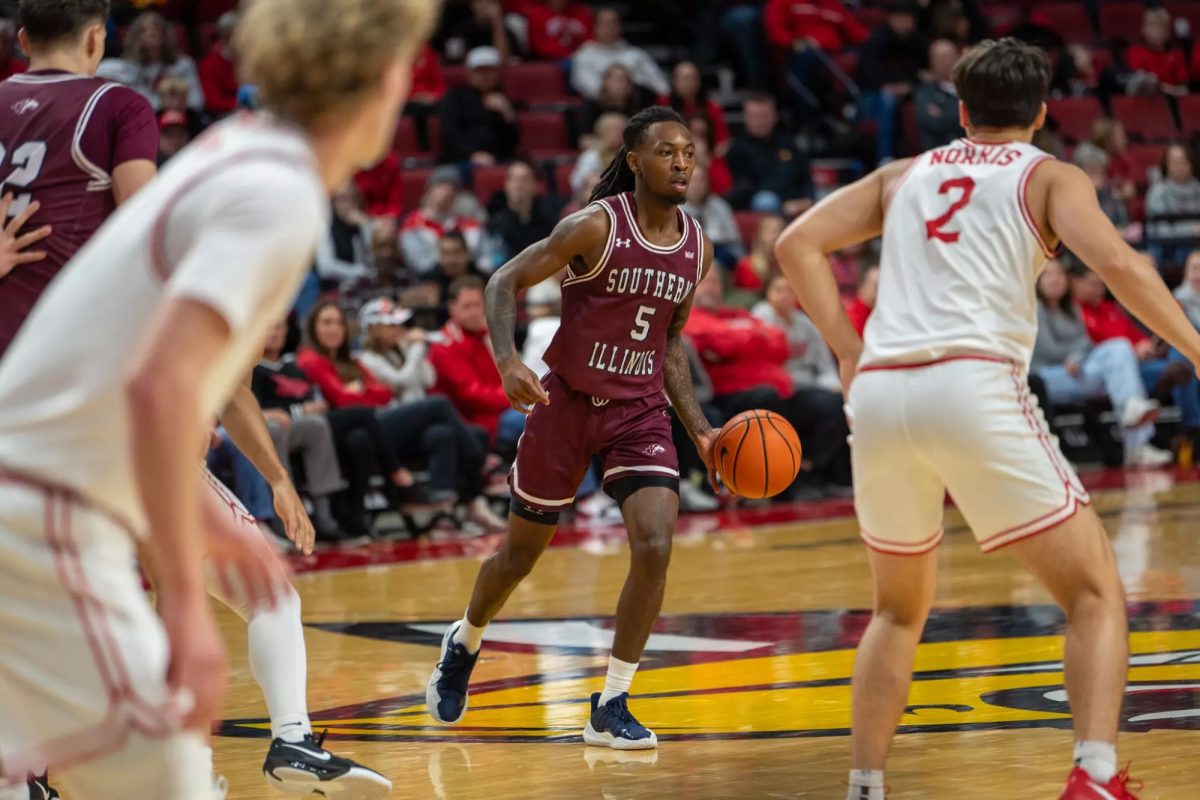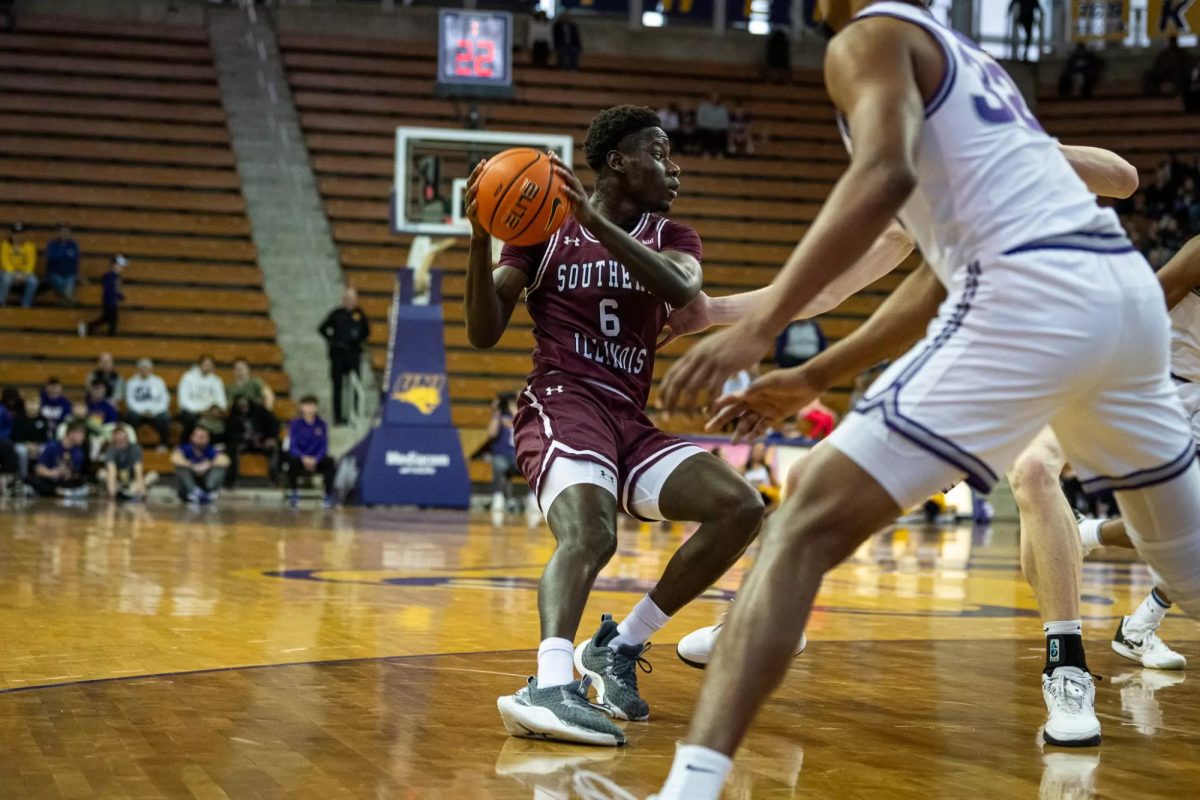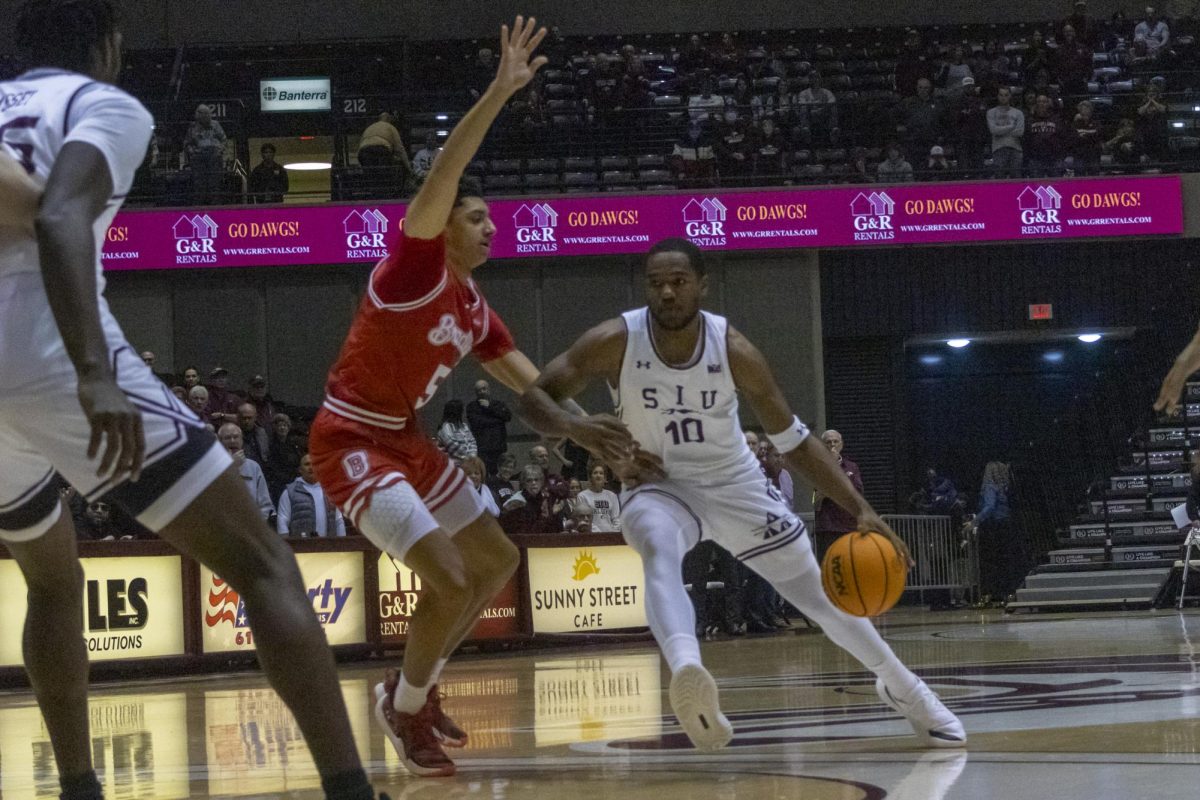When a player averages zero minutes over the first month of the season, and not because of an injury, they typically aren’t counted on to be a major contributor to their team.
Jarrett Hensley is the exception. He isn’t supposed to be the hero. He wasn’t even supposed to play college basketball this season.
Now, the 6-foot-8 senior forward is an indispensable part of SIU’s and coach Bryan Mullins’ rotation, averaging more than 13 minutes per game in the Salukis’ last seven outings and making standout plays while doing so.
Advertisement
“Just to be able to contribute to a really good team… hopefully we can just continue to build and get better as a team,” Hensley said.
Hensley is certainly making the most of his time. He played a key role in SIU’s Feb. 17 win against No. 23 Indiana State, and most recently earned his first start as a Saluki against Evansville on Sunday.
“He’s a relentless worker,” teammate Trent Brown said. “He’s okay playing the five for us, which is obviously not his natural position, but he’s just that type of teammate that’s willing to do whatever to be on the floor and get things done for us.”
Hensley’s signature play, and one that sealed the win, was a massive block off the backboard against Indiana State in the final 10 seconds of the Dawgs’ upset win in Carbondale, their first win against a ranked opponent since beating Wichita State in 2013.
Just when it seemed things couldn’t get better, Hensley outdid himself in SIU’s home victory against rival Murray State just days later. Starter Clarence Rupert was out due to illness and star guard Xavier Johnson was held to only seven points, but Hensley stepped up with a season-high 15 points, including the go-ahead putback in the final minute.
“He’s been a special player, even in practice before he was allowed to be in the games,” Brown said. “He’s not doing anything that I didn’t think he was capable of… I applaud him for it, but I’m not surprised by it.”
None of this should have happened. Back in August, after a summer of practicing with the Salukis, Hensley was informed that he was ineligible to play this season due to the NCAA’s undergraduate transfer rules.
Advertisement*
“They kind of took me by surprise,” Hensley said.
Saluki head coach Bryan Mullins was also surprised by the ruling, but knew thought Hensley would still have a chance to play.
“We knew that there was a potential for him not to be able to [play], but we thought with everything that happened at Cincinnati and his case, we thought that he would be granted, that he would be able to play,” Mullins said. “Obviously going into it, there’s always a slight chance, but just in terms of talking to Cincinnati… They were all supporting his case and things like that. So we thought we had a really good chance for him to play, not knowing 100% though.”
Hensley transferred for the first time after his freshman season, from UNC Greensboro to Cincinnati, to follow his coach, Wes Miller, who had just been hired by the Bearcats. After three years of playing roughly seven minutes per game under Miller, and as Cincinnati prepared to move up to the Big XII, Hensley decided that SIU was “the next stop for me and what’s best for me.”
He arrived in Carbondale and spent a full summer practicing with the Salukis before receiving the news of his ineligibility as the school year began.
“It was pretty challenging,” Hensley said. “Coming in in the summer and establishing who you are, your role and what you can do. And then being told that you can’t compete now, and you kinda have to take a step back a little bit.”
Hensley was still an important part of the program, participating on the scout team during practice and being a vocal supporter on the bench during games.
“He’s been one of our hardest workers,” Mullins said. “He’s got a great smile, a great personality. He brings a ton of energy on the bench when he wasn’t playing, and then during the games, in the locker room, in the apartments. He’s close with everyone. He’s not just close with one or two of the guys; he’s close with all 13 of the other guys.”
Despite being out of the lineup, SIU and Cincinnati were both fighting to get Hensley eligible.
“Coach Mullins, he kept telling me, calling me into his office and just talking about the appeal process, how they were gonna try and help me, and how Cincinnati was gonna try and help me,” Hensley said. “Everyone was just kinda on my side.”
A glimmer of hope for the Kansas native emerged when he, along with SIU football player Noah Fenske and several other NCAA athletes, joined a lawsuit filed against the NCAA by multiple states. The lawsuit alleges that the NCAA’s transfer rule, which states that athletes on their second transfer must sit out a season before being allowed to play, violates antitrust laws.
On Jan. 18, the federal Department of Justice’s antitrust division also sued the NCAA as a co-plaintiff in the suit. Sean Burke, writing for SportsLitigationAlert.com, said that the DOJ’s inclusion on the lawsuit could “end NCAA restrictions on athlete movement.”
Other issues in the lawsuit include Name, Image and Likeness [NIL] deals, which were cited as one of the main issues within the lawsuit; the plaintiffs claim that the NCAA was limiting their ability to produce income off the NIL system. The lawsuit also alleges that the NCAA, in the words of Burke, “participates in anticompetitive ethics through the restriction of economic opportunity via the multi-time transfer rule.”
All of these issues can be traced back to the overarching idea of the lawsuit, alleging that the NCAA is violating the Sherman Antitrust Act, which outlawed certain monopolistic business practices, mainly concerning trusts.
According to the Associated Press’s Dec. 7, 2023 article on the subject, mental health issues were also cited in Fenske and Hensle’s transfer cases.
In many past cases against the NCAA, a waiver was the only way that student athletes were able to gain eligibility to play immediately. Hensley tried, unsuccessfully, to get one for the 2023-24 season.
“I knew there was a chance [that I would play]. I didn’t know what was going to happen, so I was just kind of in limbo for however long that was. So that was tough, but that chance really kept me going, just to be ready this year,” Hensley said.
Brown noted how Hensley kept his head up and kept working during the time he was confined to the bench.
“I just give him all the credit in the world for sticking with it and battling that, even when obviously he’s seen the games roll by and just his chances starting to dwindle,” Brown said.
When the news broke on Dec. 13, 2023 that a temporary restraining order had been placed against the NCAA, it became official that Hensley and other NCAA athletes would be allowed to play during at least part of the 2023-24 academic year. That eligibility would later be extended through the rest of the season.
“I was just relieved for him,” Brown said. “I just know how much it had been weighing on him. We’ve had discussions at length in my apartment, just sitting there, thinking how much it was kind of messing with him… I found out when he wasn’t here and I had to FaceTime him immediately. And he was just smiling ear-to-ear. I was too, it’s hard not to. Good things should happen to good people like him, so he deserves that.”
Though Hensley had been practicing with the team since the summer, he hadn’t played in games with SIU yet, which had already finished most of its non-conference slate for the year.
Hensley initially played hefty minutes in his first six games as a Saluki, and even put up double digits in points in his second and third games. But SIU hit a slump after losing to Drake on Jan. 13, and for the last six games of the month, Hensley only played seven minutes per game.
“I think he was excited, and you know, with excitement comes nerves and energy and emotions,” Mullins said. “I think through those first couple weeks of when he was cleared to play, there were some ups and downs. He had some good games for us. He probably had some frustrating games where he felt like he wanted to play better and didn’t.”
Mullins also touched on the challenges that come with integrating a new player that far into the season.
“When you do it halfway through the season, in terms of the team too, as a coaching staff, we’ve got to find ways to use him and how to develop him into the game plan; rotation, subs, all that stuff,” Mullins said. “So I think there was just an adjustment period for him, just in terms of gaining experience in the games, and then from a coaching staff, how can we use Jarrett in the best possible way.”
In the month of February, Hensley has played over 13 minutes per game. He most recently put in a season-high 18 minutes against Murray State on Feb. 21 when starting big man Clarence Rupert was out with an illness.
“I really feel like these past two weeks or so, a month, I’m getting it back, and just really feel the trust and belief from my guys and the coaching staff,” Hensley said.
Mullins and the coaching staff have been able to put Hensley in a spot to make more of an impact too.
“I think it took us some time, but I think these last couple weeks, I think he’s a lot more comfortable out there,” Mullins said. “I think as a staff, we kind of have a little bit better feel too for the rotations and lineups.”
As his playing time became more consistent again and he got into the playing groove, Hensley’s impact exploded, with him becoming one of the most important Dawgs on the court, especially for his rebounding.
“Jarrett’s a unique player because of his versatility,” Mullins said. “I think the biggest thing for him has been getting experience. Even though he’s been in college for a couple years now, he hasn’t had a ton of experience in terms of minutes played, and the more he’s been playing, the better he’s gotten… He can do some things other guys on our team can’t do, and I think his instincts are getting a lot better throughout the course of the game too.”
Hensley’s emergence as a difference-maker could not have come at a better time for SIU. Recent wins against Indiana State, Murray State and Evansville have the Salukis sitting alone in fourth place in the MVC with two games left in the regular season.
With the grind of the Valley season taking its toll, the ability to fill in those minutes where the Dawgs may be affected by injury, illness, or even general fatigue, might be Hensley’s greatest asset.
“We’re jockeying for position right now, just in our own conference, so when it comes to the conference tournament and you try to win those three or four games in a row, you’ve got to be able to go into your bench and dig out wins,” Brown said.
The smooth play of Hensley has also helped the Salukis regain some of the swagger and start to look like the dominant team they were in November.
“My dad used to say, you don’t have to play perfect, you just have to play perfectly hard,” Brown said. “Having someone like [Hensley] be able to come off the bench and truly play like a starter essentially, because he’s that talented, is massive for us.”
After sitting on the bench for the first nine games of the season, and even with Arch Madness set to begin on March 7, Hensley isn’t taking anything for granted.
Hensley said, “I remember the day I became eligible, I just told myself, good game, bad game, I get zero points or 30, we win or we lose, just be grateful and happy that you get to play.”
Advertisement










